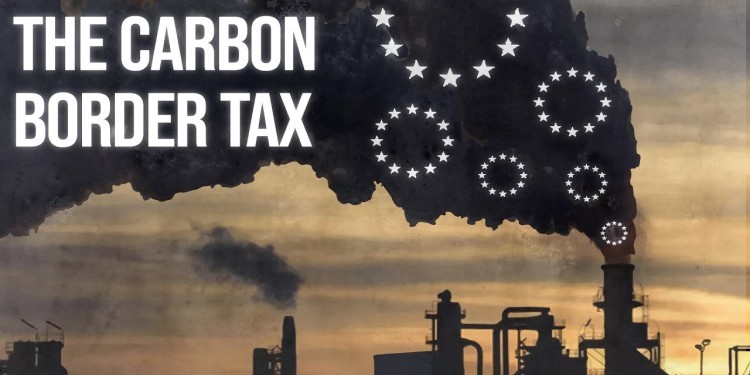Description

Disclaimer: Copyright infringement not intended.
Context
- The EU Parliament passed the Carbon Border Adjustment Mechanism Bill.
- The law will authorise the EU to charge Carbon Border Tax (CBT) on imports of steel, aluminium, fertilizer, electricity, cement, and hydrogen from January 2026.
What is a carbon border tax?
- A carbon border tax is a tax imposed on imported goods to equalize the cost of carbon emissions between domestic and foreign producers.
- The tax aims to address the issue of carbon leakage, where companies move their emissions-intensive operations to countries with less stringent regulations, resulting in a net increase in emissions.
- As a cost on carbon, it discourages emissions. It has an impact on exports and production as a trade-related measure.
- As a price on carbon, it discourages emissions. As a trade-related measure, it affects production and exports.
READ: https://www.iasgyan.in/daily-current-affairs/carbon-border-tax

EU’s Carbon Border Adjustment Mechanism
- CBAM EU’s plan to reduce greenhouse gas emissions by at least 55% by 2030 compared to 1990 levels, in line with the European Climate Law.
- The EU’s primary mechanism for incentivizing industry to decarbonize is through carbon pricing and to meet its 2050 targets; these prices will need to rise substantially.
Reason for implementing CBAM
Carbon Leakage
- For the European Union (EU), climate policies in other countries remain "less stringent," and there is a possibility of "carbon leakage."
- This refers to the possibility that EU-based businesses could shift emission-intensive production to jurisdictions with lax standards, or that EU products could be replaced by imports that are less expensive but use more carbon.
- As a result, the CBAM acts as a "price equalizer." Further, the EU sees it as an alternative to free allowances in its Emissions Trading System (ETS), which addresses leakage but does not encourage environmentally friendly production within the EU, says Financial Express analysis.
In a nutshell,
- Carbon Border Adjustment Mechanism (CBAM), which aims to equalize the fees on the carbon content of goods in the EU regardless of where they were produced by imposing carbon border taxes.
- The proposal initially covers cement, iron and steel, aluminium, fertilizers, and electricity; any carbon fees already paid at the source will be deducted. The proposed CBAM could help alleviate “leakage.”
- When emissions are restricted in the home country, for example by cap-and-trade mechanisms, firms can relocate production to other countries to avoid restrictions—giving rise to pollution havens.
- Consumers in the home country can then buy cheaper, carbon-tax-free imports rather than the more expensive domestic alternatives.
- The fact that most high-income countries have become net importers of CO2 while most developing economies are net exporters indicates that leakage is a serious problem.
- Carbon border taxes can suppress this effect by effectively equalizing carbon prices for domestic and foreign producers in the home market.

What is the issue?
- India's concern is that these border taxes on its goods entering EU would increase the prices of Indian-made goods and make them less attractive to buyers and could negatively affect demand.
- Such a tax could pose a serious threat to companies with larger greenhouse gas footprints.
- In a joint statement at the COP27 in Sharm El Sheikh; Brazil, South Africa, India, and China criticized the EU's proposal as "discriminatory" and contrary to equity and "Common but Differentiated Responsibilities and Respective Capabilities" (CBDR-RC).
- In order to combat climate change, these principles acknowledge that richer nations have a duty to provide technological and financial support to developing and vulnerable nations.
- India's third-largest trading partner is the EU. This tax could reduce demand and make Indian goods less appealing to consumers in the EU by raising their prices.
- Companies with a larger greenhouse gas footprint would face significant challenges in the near future as a result of the tax.
- The CBAM puts the burden of climate action on them, while the rich countries have contributed the most to warming.
Closing Remarks
- At COP 27, India's Environment Minister said that ‘just transition’ to cleaner sources of energy did not mean that all countries should strive for the same level of decarbonisation.
- For India, just transition means the transition to a low-carbon development strategy over a time scale that ensures food and energy security, growth, and employment, leaving no one behind in the process.
|
PRACTICE QUESTION
Q. What is a Carbon Border Tax? According to India EU's Carbon Border Adjustment Mechanism (CBAM, is "discriminatory" and contrary to equity and "Common but Differentiated Responsibilities and Respective Capabilities" (CBDR-RC). Do you agree?
|

https://www.thehindubusinessline.com/opinion/7-ways-to-ease-impact-of-carbon-border-tax/article66770651.ece













